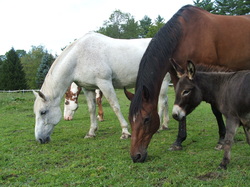
An Equine Herpes Virus 1 (EHV-1) outbreak is currently spreading through the Midwest, meaning that practicing proper biosecurity habits in your barn is more important than ever. The virus is highly contagious, is spread through the air or via contaminated equipment, and affects the horse’s central nervous system. The outbreak began with barrel horses and likely spread at show grounds; two affected horses have had to be euthanized.
To protect your horse, good biosecurity habits are necessary. Any new horse that comes onto your property should be quarantined from other horses. If you travel to other barns, it is best to change your clothes and shoes, and thoroughly wash your hands before handling horses on your own farm.
If you travel to a show, keep your horses separated from those of other competitors. Bring along your own water buckets to avoid having your horse drink out of a communal water trough. Fill buckets by holding the hose above the bucket – don’t drop the hose into the bucket, since this could cross-contaminate the water.
Bring your own equipment to the show, including a pitchfork. You should only use your own tack and grooming kit on your horse; keep everything separate and secured in your trailer so your equipment can’t accidentally be used on another horse. Wash your hands frequently, and always wash them before and after handling your horse.
You will also want to carefully watch your horse’s health during and after the event. A horse with EHV-1 typically presents with a fever, coughing, nasal discharge, and a depressed appearance. Some horses may go off of their feed. Horses with neurological symptoms may seem off-balance, have difficulty rising or standing, and appear uncoordinated. If you suspect that your horse has EHV-1, call your veterinarian immediately and quarantine your horse from any other horses on the property.
Many shows and events in the Midwest have been cancelled until the outbreak is brought under control. While the virus does not affect humans, it can prove fatal for horses. Anyone competing or traveling in the United States should use caution and good biosecurity practices.
To protect your horse, good biosecurity habits are necessary. Any new horse that comes onto your property should be quarantined from other horses. If you travel to other barns, it is best to change your clothes and shoes, and thoroughly wash your hands before handling horses on your own farm.
If you travel to a show, keep your horses separated from those of other competitors. Bring along your own water buckets to avoid having your horse drink out of a communal water trough. Fill buckets by holding the hose above the bucket – don’t drop the hose into the bucket, since this could cross-contaminate the water.
Bring your own equipment to the show, including a pitchfork. You should only use your own tack and grooming kit on your horse; keep everything separate and secured in your trailer so your equipment can’t accidentally be used on another horse. Wash your hands frequently, and always wash them before and after handling your horse.
You will also want to carefully watch your horse’s health during and after the event. A horse with EHV-1 typically presents with a fever, coughing, nasal discharge, and a depressed appearance. Some horses may go off of their feed. Horses with neurological symptoms may seem off-balance, have difficulty rising or standing, and appear uncoordinated. If you suspect that your horse has EHV-1, call your veterinarian immediately and quarantine your horse from any other horses on the property.
Many shows and events in the Midwest have been cancelled until the outbreak is brought under control. While the virus does not affect humans, it can prove fatal for horses. Anyone competing or traveling in the United States should use caution and good biosecurity practices.
 RSS Feed
RSS Feed
